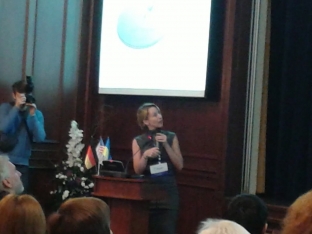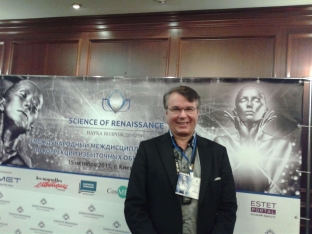Today, a significant event in aesthetic medicine is taking place in Kyiv. Company "EMET" organized the first International Interdisciplinary Congress on the correction of excess face and body volumes, where the development and creation of innovative technologies in the field of anti-age therapy of skin cells are discussed.
Expected to discuss the scientific approach to work with adipose tissue and practical developments that give beauty and youth to patients. This event takes place for the first time on the territory of Ukraine. The experience of our colleagues from different countries on the correct regulation of face and body volumes is very important to us. How to use the acquired knowledge in practice – All this is promised to be taught by the speakers of the congress. A professional dialogue between specialists in fundamental science and aesthetic practice is coming.
Olga Rogovaya, President of the EMET company, delivered a welcoming speech and talked about how not so long ago the company had only one product, and now it offers five new injectables that doctors use with pleasure and for which they grateful patients.
Olga Rogovaya emphasized that the approach to treatment in aesthetic medicine must be comprehensive. Therefore, the company invited representatives of various industries to speak. She also noted that, as a fan of the Estet Portal, she is very glad that the coverage of the congress will be comprehensive and interesting.

Nadezhda Kryzhanovskaya, Ph.D. doctor-therapist of the highest category, specialist in anti-age medicine.
Presentation topic: "Etiopathogenesis of overweight and involutional changes in volumes from the standpoint of a specialist in anti-age medicine".
The problem of obesity is very relevant today. According to WHO, 13% of the world's population is obese. Subcutaneous adipose tissue – this is a wide field for the work of estheticians. But visceral adipose tissue is extremely difficult to correct. Intramuscular adipose tissue is also practically inaccessible for correction by sports and diets.
Some of us have a genetic predisposition to obesity (according to various sources, about 30% of people). Metabolism, race, gender, age – all of this matters for body weight. Ethnic and cultural factors, socio-economic and psycho-emotional status of the patient, endocrinological diseases, taking antidepressants and some other drugs – all this also greatly affects the possible development of obesity.
The fat cell (adipocyte) plays an important role in the body, as it sends a number of signals to the body about ongoing processes, including the number of inflammatory The main reason for the accumulation of adipose tissue – it's still overeating. If we have an excess of fats obtained from food, they are stored in the reserve.
Leptin – the main regulating hormone of eating behavior, it is its action that determines satiety. Adiponectin – predominant protein, stimulates lipolysis. These proteins – antagonists in the body that affect weight loss. Insulin – anti-lipolytic hormone that enhances lipogenesis.
It has been observed that many obese patients have elevated levels of the hormone cortisol, insulin resistance, Helicobacter pylori infection, and impaired production of somatotropic hormone.
A person does not have an organ that would not suffer from overweight. Metabolic syndrome leads to the development of many systemic diseases, in particular, it triples the risk of fatal cardiovascular accidents.
How to treat metabolic syndrome? Move. Reduce the calorie content of the menu. Pay attention to antioxidants. Avoid stress. If necessary, use medical therapy or resort to surgery.

Tetyana Nazarenko (psychologist, gestalt therapist, supervisor. cognitive-behavioral counseling, psychotraumatherapist. Focus of practice: eating disorders, body weight problems and body image disorders. Director of the "Center for Psychological Education and Professional Development", Ukraine. Co-chair "Institute for Psychosocial Research and Personality Development", Germany.)
Speech topic: "Psychological aspects of weight gain and body image disorders"
Eating Disorders and Body Image Disorders – common problem today. They manifest in Binge Eating, Bulimia, Anorexia.
Compulsive overeating is characterized by a negative attitude towards one's body. But the more a person pays attention to their weight, the more important is the psychopathology specific to overeating. At the same time, the patient's dysfunctional attitude to his body does not depend on his actual body weight.
Emotional eating behavior occurs in 60% of obese people. Emotional binge eating is not an eating disorder. It is a way to satisfy needs with food. The stimulus for eating is not hunger, but emotional discomfort.
Dysfunctional attitude towards one's own body is strongly expressed in all eating disorders. It arises from a negative perception of one's own body image and leads to a delusional, overvalued idea – lose weight.
Body Image – it is a living synthesis of our emotional experiences. The girl is initiated by her mother, grandmother in the ability to accept her own body and its attractiveness. The body image includes the entire biography, the entire experience of relationships, family standards, bodily interaction with other people. Also important is the likely traumatic experience that occurs during emotional experiences.
If the patient is sure that the body will be corrected, lose weight – means a change in all life for the better, this is an alarming sign. If the patient has no one to share this pain with, he goes to a beautician or plastic surgeon with a request to solve his problem and correct his appearance.

Alexander Kolyada, geneticist, gerontologist, co-founder of the American company Titanovo Inc, researcher at the Institute of Gerontology of the National Academy of Sciences of Ukraine
Presentation topic: "Molecular mechanisms of adipocyte vital activity. Just about the complex"
What do you look like – programmed genetically. Genetics is important because it explains a number of details that determine the patient's tendency to a number of diseases, including the accumulation of excess body weight.
If we take as an example the genetic propensity to perceive, say, coffee, then for some of us, 4 cups of coffee doubles the risk of developing a heart attack, and for others – also reduces this risk and also prevents breast cancer and some other problems.
Regarding predisposition to obesity – there are genes responsible for metabolic rate, the same applies to susceptibility to diets, genes are responsible for the transport of nutrients in the body, for their absorption.
Epigenetics allows you to determine the genes responsible for regulating body weight, and adjust the diet. We dream of finding a drug that would affect this process. One of these drugs – Megasculpt by EMET.
Coffee break is a great opportunity for the guests of the congress to communicate with colleagues. And for Estet-portal - to get an exclusive smile from Klaus Hoffman.








Add a comment